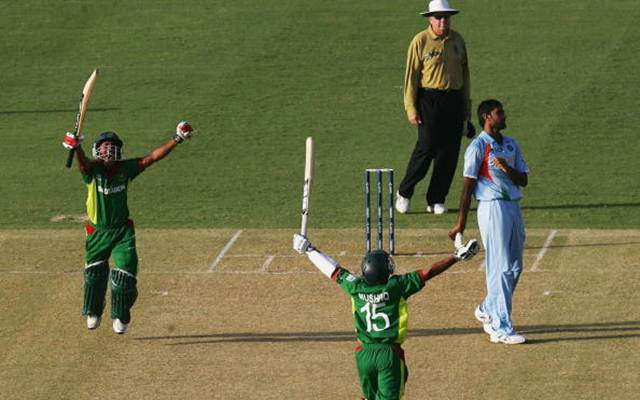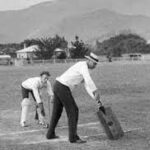
Cricket is an unpredictable sport. As the legends say a game of cricket doesn’t end until the last delivery of the last over is bowled. Every four years comes the biggest ICC tournament of the sport, The 50 over Cricket World Cup. Teams build and strengthen themselves for four years before entering the Worldcup to claim themselves as the World champions. But over the years we have seen many small underdog teams coming out strong and defeating the prominent ones. So today in this article we will discuss six of the biggest upsets in the World Cup history the sport has seen.
The first upset we gonna speak about is when clear underdogs India defeated the mighty West Indies in the 1983 World Cup final to lift their maiden ICC trophy.
Ahead of the tournament, no one would have given India any chance of making it to the knockouts, leave alone winning the final but some amazing performances in the league stages had revived hopes of the Indian fans. India got off to a shaky start losing the Little Master Gavaskar early and tight West Indian bowling ensured India was dwindled out for 183.
West Indies came into bat in the second innings all guna blazing and it seemed the match tools end before 35 overs itself but Kapil Dev pulled off a stunning catch to send him back in the hut. This was a major boost to the Indian bowling and Mohinder Amarnath’s medium pace claimed three of the final four wickets to fall, as West Indies were bowled out for 140. India had achieved the impossible and has shown the world that they were no less than a world champion. Not only did this remain as a major gem of Indian cricket but it also inspired many Indian children to pursue their passion for cricket.
The second upset we gonna speak about is during the 2003 World Cup when Kenya defeated Sri Lanka and send the cricket fraternity into shock. Kenya pulled off a better show in the first innings as they scored 210/9 in 50 overs with Kennedy Otieno being their top-scorer. This was not a huge total but Kenya, despite internal government unrest was playing pretty good in their home ground. It was Tillakaratne’s wicket that turned the match on its head: with 140 to score from 195 balls, he holed out to Tony Suji and it was Obuya’s first wicket of the match. Mahela Jayawardene hit one back to Obuya, while Kumar Sangakkara was caught behind.
It seemed as if the Kenyans were fielding for their life. They pounced upon anything in a 20m radius around them and owing to the electric fielding saved quite a lot of runs making the task even more difficult for the Lankans. Odumbe ended things when Dilhara Fernando tried to reverse-sweep him and played on to the stumps. Otieno grabbed a couple, and off they ran into a huddle, celebrating, jumping, and dancing in unison as a forlorn Arnold looked on. Jayasuriya later in the post-match conference stated that he was disappointed by the way the proceedings went and that it was the worst match of his entire career.
The third one of the biggest upsets in the group stages of the 1983 World cup was minnows Zimbabwe beating a strong Australia in Nottingham. Put in to bat by the Aussies, Zimbabwe got off to a good start but were reduced to 97-4. Came in Kevin Curran to join Fletcher who ensured that the scoreboard kept on ticking slowly and steadily. Fletcher, however, top-scored with 76 not out and took his side to 239 for 6 at the end of the 60 overs. Although the score wasn’t matched winning but was defendable but looking at the mighty Australian side it didn’t seem quite possible.
Came in the Aussies for the second innings and following Graeme Wood’s dismissal for 31, the Zimbabwean bowlers continued to pick up wickets at regular intervals, with Fletcher again starring with the ball. Fletcher was at his level best that day and returned to take four wickets including big names such as Allan Border and Rodney Marsh. Soon after Border fell the Aussie lower order fell like a pack of cards and the Zimbabwean bowlers were bowling with a new zeal and spirit. In one of the biggest upsets of all time they had defeated the mighty Kangaroos by 13 runs and marked the day as a historic time in the history of Zimbabwe cricket.
The fourth upset we gonna speak about is during the 1992 World cup where Zimbabwe recorded just their second Cricket World Cup win in 1992 (and nine years after their first), toppling England in a low-scoring game at Albury, Australia. England’s spin duo of Richard Illingworth and Phil Tufnell ended up taking five wickets between them, leaving their batsmen with a seemingly straightforward task to score a mere 135 for a victory. Looking at the mighty batting line-up England had and the underdog opponents it was meant to be a cakewalk for the Brits but luck had something other in store for them.
Graham Gooch fell to the first ball of the innings, one of four wickets to be taken by Zimbabwe seamer Eddo Brandes. Eddo was suddenly in the form of his lifetime and bowled a match-winning spell under difficult circumstances. England—who went on to reach the final—did make it to 95 for five but lost the rest of their side for 30 runs. They were all out for 125, meaning Zimbabwe had ended a run of 18 straight World Cup defeats. This match is remembered as one of the biggest letdowns of the 1992 Worldcup where they stopped a heavy-duty English team from chasing a mere total of 134 on a pitch which was no different from ordinary.
The fifth upset we gonna speak about is during the 2003 Worldcup in a match between Canada and Bangladesh. Having recorded the odd surprise win themselves, Bangladesh found the tables turned when they faced Canada in 2007. Everything seemed to be going to plan for the Tigers when they bowled their opponents out for 180 at Kingsmead in Durban, South Africa. Bangladesh was totally on course for yet another win and a comfortable rip off over the underdogs Canadians but they did not see what was to come. They reached 33 without loss in the first ten overs itself but after that, it was Canada’s turn to fight back.
Austin Codrington was the hero for the Associate nation, the seamer—born in Portland, Jamaica—claiming five for 27 in his nine overs. He took the last three wickets for the addition of just one run, sealing a stunning triumph when he had Mohammad Rafique caught by John Davison for 12. Thanks to this amazing piece of bowling Bangladesh lost 19 wickets for just the addition of 87 runs to the scoreboard and it was nothing more than a terrible heartbreak for them. The Canadians were elated as this was the first time they had proved their mettle against stronger opposition and were all over the ground once the last Bangladeshi wicket fell.
The last upset we gonna speak about is the biggest in Indian history when the clear non-favorite Bangladeshi side defeated us and knocked us out of the 2007 World Cup race. The format of the 2007 Cricket World Cup was different and a bit more complex as there were the 16 competing nations were split into four groups, with the top two in each going on to participate in the Super Eight stage. In the match against Bangla tigers, India was bowled out for 191 after choosing to bat first, though their final score would have been even lower had it not been for an uncharacteristically patient 66 from Sourav Ganguly. Although this wasn’t a match-winning total Indian fan were optimistic for a win thanks to India’s strong bowling line up.
The 18-year-old opener, Tamim Iqbal, started the proceedings for Bangladesh in flamboyant style. He was all over the Indian pacers wielding his bat like a sword. Tamim raced to a fine half-century as Bangladesh raced to 69 in 13 overs. Munaf Patel had Tamim caught behind to halt the minnows’ progress but they had another young talent in Mushfiqur Rahim at the crease along with Shakib Al Hasan.singles. The duo took Bangladesh to within a touching distance of victory when Sehwag broke through with the wicket of Shakib. He had skipper Habibul Bashar as well to trigger hopes of an unlikely comeback but Rahim wasn’t letting this one through. He ensured he stayed till the end defeating India and knocking then out of the competition marking it as one of the biggest upsets in the Indian Cricket history.




